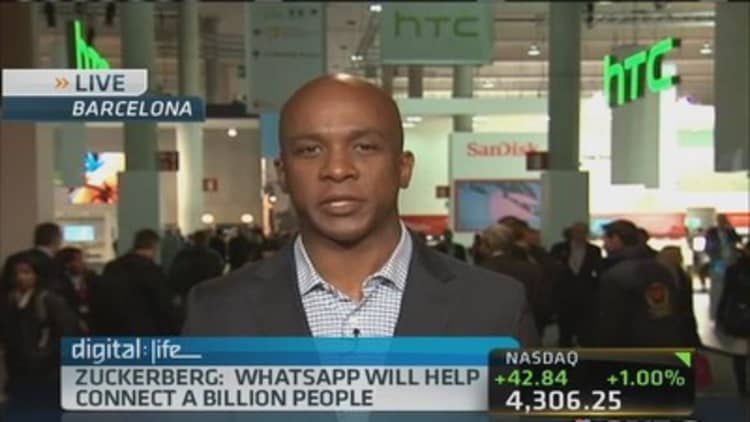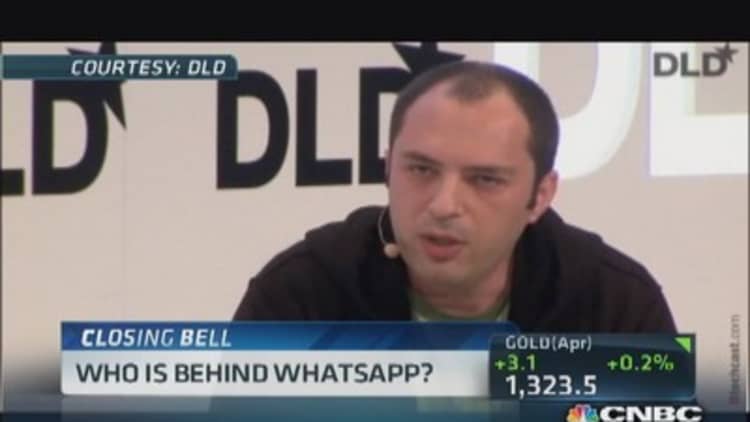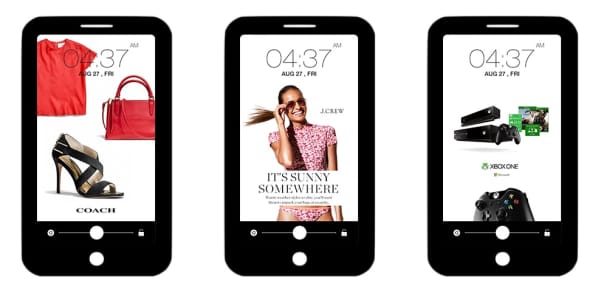
Facebook founder and CEO Mark Zuckerberg said Monday that WhatsApp fits perfectly with his goal of connecting the world and that the messaging platform was worth what his company is paying for it—and then some.
Last week's $19 billion deal for WhatsApp was Facebook's largest yet—dwarfing the $1 billion it paid for Instagram.
To some, the move was not a wise one.
"This is crazy money," Rob Enderle, principal analyst at Enderle Group, told CNBC at the time. "I think they massively overpaid. ... They've done it because they are desperate."
(Read more: Why Facebook valued WhatsApp at $16 billion)
Zuckerberg defended the move in his keynote speech to the Mobile World Congress in Barcelona.
"Already almost half a billion people love using WhatsApp for messaging, and it's the most engaging app that we have ever seen exist on mobile by far," he said. "About 70 percent of people who use WhatsApp use it every day, which kind of blows away everything else that is out there."
WhatsApp is well on its way to connecting 1 billion people, Zuckerberg said, and few services in the world attain that reach without becoming valuable. WhatsApp has more than 450 million users a month.
"I think by itself it's worth more than $19 billion," he said. "It's hard to exactly make that case today because they have so low revenue. … I could be wrong—there is some chance that this is the one service that gets to a billion people and ends up not being that valuable—[but] I don't think I am."
Earlier in the day at Mobile World Congress, WhatsApp CEO Jan Koum said it would be offering a voice service in the second quarter.
(Read more: WhatsApp will add voice to messaging service)
For Zuckerberg, WhatsApp coalesces with Facebook's aim of connecting everybody in the world, a goal that's also behind Internet.org.
Formed last summer, the initiative has Facebook, Ericsson, MediaTek, Nokia, Opera, Qualcomm and Samsung working with nongovernmental organizations, mobile operators and tech firms to make Web access more affordable and accessible.
Though many talk about 6 billion mobile users, what's forgotten is that many of those users do not have Internet access—not because smartphones are expensive but because data plans are, Zuckerberg said.
"Owning an iPhone for about two years costs about $2,000 in the U.S. About $500 of that is the phone and $1,500 is the data plan," he said, adding that some people aren't sure that they need such a service.
"You get caught in this catch-22," Zuckerberg said. "You have enough [money] that if you wanted to you could buy an Internet data plan, but you don't know what you would get with that because you've never had access with that."
Internet.org wants phone providers to offer basic services—including messaging, Facebook, weather, food prices and Wikipedia—free so that a wide population understands the Web's importance and signs on for more robust packages. That's when operators can make money from data, he said.
Zuckerberg emphasized that many apps must become more efficient, noting that the average Facebook user once wasted 14 MB of data a day on the app, whereas his team has cut that to 2 MB.
On another matter, the CEO said that while Edward Snowden's revelations about National Security Agency surveillance showed that the government "blew it" when it on transparency, the event had unified the tech industry.

"The issues with the NSA actually have the industry working together better than I've ever seen it working together before," Zuckerberg said.
Commenting on the keynote address, Rob Thurner, co-founder of Burn the Sky, a mobile agency, said in a note, "We've all known the game plan is global reach and ... it's extremely interesting the company is taking a philanthropic route."
(Read more: Mobile Congress, what to expect)
However, he said, "given that mobile advertising is now responsible for [53 percent] of Facebook's total revenue, and mobile users account for over 75 percent of the total user base, the natural suspicion is whether Facebook would seek to flog advertising to billions of unsuspecting consumers."
Dave Bovenschulte, executive vice president of digital strategy and creative at Zemoga, said, "You have to applaud Zuckerberg's long-term vision ... although it does seem slightly naive in today's financial world of short-term profits. But if there's one guy well positioned to change things, it's him."
At the end of the keynote, Zuckerberg was asked whether he would revive his attempt to buy messaging app SnapChat.
"After buying a company for $16 billion," he said, "you're probably done for a while."
—By CNBC's Kiran Moodley




